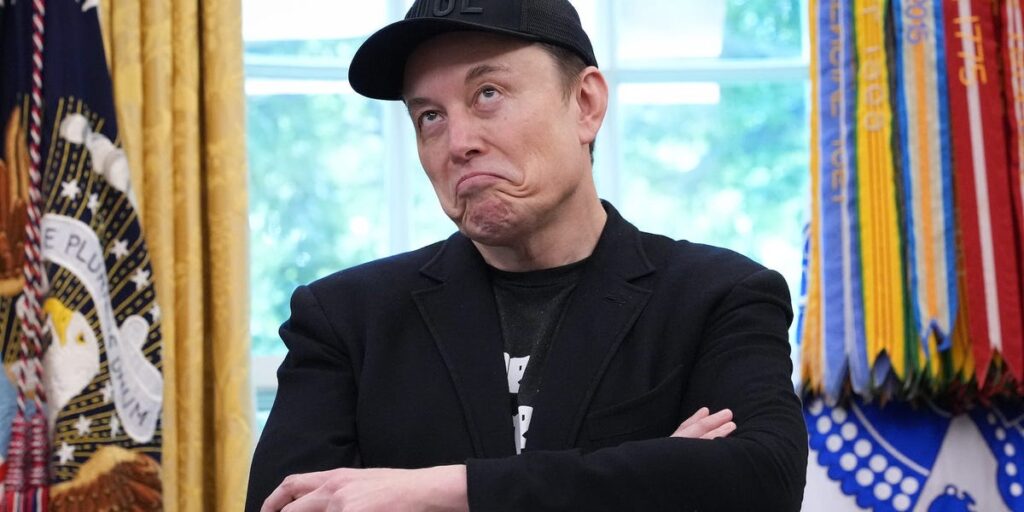Star talent can be hard to retain — and even harder to let go.
The public fallout between President Donald Trump and Elon Musk this week may be an extreme example of a hotshot’s exit going off the rails, but leadership experts said it underscores just how dicey it can be to part ways with a high-profile team member.
“These are folks with big egos,” Peter Cappelli, a management professor at the University of Pennsylvania’s Wharton School, told Business Insider. “Most of the time they end up in court.”
Saying goodbye to a prominent employee doesn’t have to be dramatic. But don’t assume a beefy severance package and a non-disparagement agreement are enough to leave a company unscathed.
“If people want to hurt you, they’ll find a way to do it,” Cappelli said. “Ask divorced couples.”
How to sever ties with a high-profile recruit
When pushing out a high-flyer, employers should frame the person’s departure as business as usual, said Ronald Placone, a communications professor at Carnegie Mellon University’s Tepper School of Business
“You try to normalize it,” he said. “Things happen, people move on.”
Trump initially followed conventional wisdom in how he went about booting Musk from Washington last month. The president orchestrated a warm and fuzzy public send-off, thanking Musk for his service and providing a sensible explanation for his departure—in this case, that the billionaire was going back to focusing on his work at the multiple companies he helms.
More common explanations are that the fired individual has decided to pursue other career opportunities, spend time with family, or engage in philanthropic endeavors. This tactic is aimed at protecting both the departee’s reputation and that of the employer showing him or her the door.
“They come up with a story,” said Anna A. Tavis, chair of the human capital management department at New York University’s School of Professional Studies.
The goal is to avoid hurting the outgoing hotshot’s chances of landing a new gig and the company’s ability to find a replacement.
“It’s a question of, how do we save face?” she said.
Give people something else to talk about
Employers should also aim to draw people’s attention elsewhere, Placone said.
“One of Trump’s strategies that often works is you just flood communication channels with other stuff, stuff you perceive is more favorable to your organization,” he said. “You try to take some control by giving as many potential stories as possible so people don’t home in on one.”
Trump did make some big announcements this week, including travel bans on several African countries, but leadership experts say the president also erred by openly rebuking Musk’s harsh criticism of his signature tax bill on X. This kicked off the back-and-forth squabble that captured the world’s attention on Thursday.
“There’s no need for that,” Placone said. “In these high-profile situations, you want to say as little as possible. You don’t want to add weight to the argument the other is putting forth.”
If Trump instead kept quiet, Musk would have been more likely to stick with critiquing the bill rather than upping the ante by accusing the president of illicit behavior, he said.
“It would’ve eventually fizzled out,” Placone said.
Why some A-list hires don’t last
Employers most commonly end up quickly sacking flashy new recruits because they aren’t as talented as advertised or they insist on working in a way that doesn’t align with a company’s culture, Tavis said.
It even happens at the very top of the corporate ladder. For example, in recent years, the chief executives of Barnes & Noble, Starbucks, and CNN were pushed out of their jobs after brief tenures.
“A lot of times they’re overestimating their value,” she said of people with a reputation for being above the fray, adding that due to the current tight labor market, notable departures are likely to increase.
Sam Faycurry, CEO of artificial-intelligence and nutrition startup Fay in San Francisco, can relate. Last year, he hired a well-known rainmaker after a lengthy courtship only to quickly conclude that the person wasn’t a good fit.
To avoid bad blood, Faycurry said he tried making it seem as if it was the individual’s decision to leave by pointing out how much they disagreed on core principles.
“This person ended up exiting themselves” without any hard feelings, Faycurry said, adding that he was relieved because his main concern was being able to refill the position with a better-aligned A-list professional.
“If the person is influential in a talent pool you want to recruit people from in the future, there’s no benefit to having a relationship fall out,” Faycurry said. “You’re never truly parting ways.”
Read the full article here
















